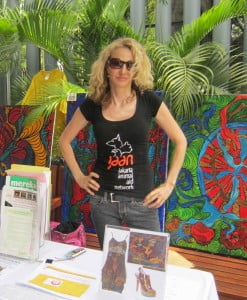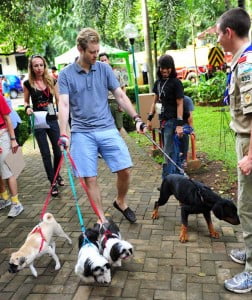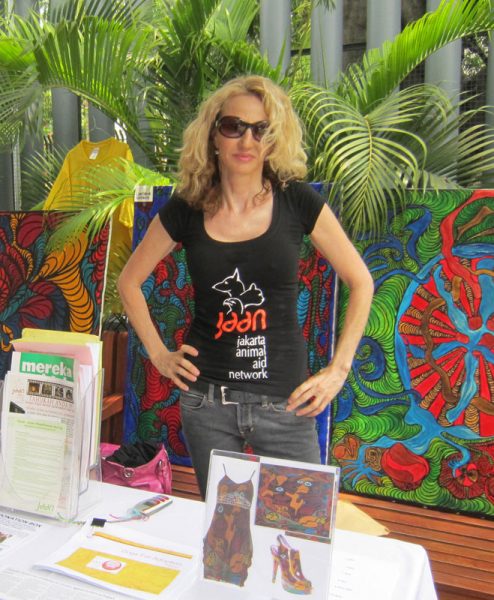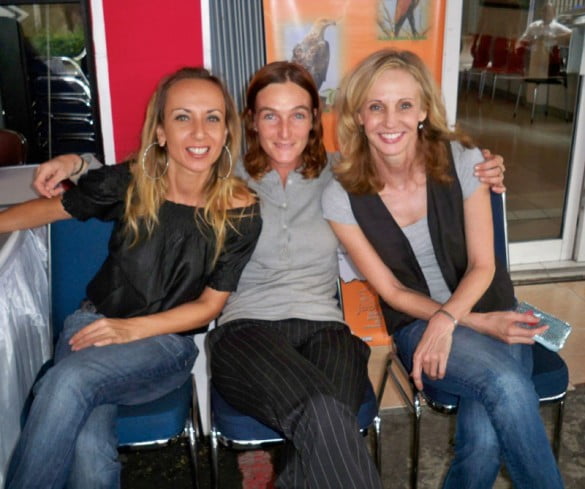Meet Natalie Stewart. American-born animal lover, animal protector and one of the founders of Jakarta Animal Aid Network (JAAN).
 Natalie, where are you originally from and how did you end up here in Indonesia?
Natalie, where are you originally from and how did you end up here in Indonesia?
I grew up in Canada but was born in the US. We have been overseas for 30 years now. My husband works in the oil industry and his job has taken us to Bangkok, Den Haag, Los Angeles, Bangkok again for 10 years and then to Jakarta in 2003.
You are one of the three founding members of JAAN along with Femke den Haas and Karin Franken. What inspired you to establish the organization?
In 2007 the three of us got together and talked about how there was no network in Jakarta for people to turn to when they had questions about animals in distress. We wanted to implement such a network and try to improve the welfare of Indonesian animals, both domestic and wild. We started small with just our dog rescue and re-homing program, our raptor rehabilitation and release program on Kotok Island, and monitoring the wildlife trade. Soon we expanded to cat sterilization, assistance for the carriage horses, campaigns to stop the performing street monkeys and protesting the illegal capture of wild dolphins used for travelling circuses.
What does JAAN strive to achieve, what are the primary goals?
JAAN strives to increase awareness about the proper care of companion animals and that wild animals should live in the wild. One of our primary goals is to rescue animals that have been abandoned, neglected and abused, and try to re-home or rehabilitate and release where possible. We use those activities to spread our message about awareness by giving presentations to schools and community groups, by giving interviews on the radio and on television and by taking every opportunity to have our work mentioned in newspapers and magazines. We believe that if people can see what we do, they will wonder why and then learn about compassion towards animals and the importance of protection of Indonesian wildlife.
There are those who believe helping animals is a waste of time when there are thousands of children who need help. What would you say in response to those people?
Helping is never a waste of time. There are many groups that help children in Indonesia and we certainly applaud their efforts to improve education and employment opportunities. We would love to see the government provide alternate employment to the people who currently live off of the exploitation of animals. Improving the standard of living of people would improve animal welfare in a trickle down effect so we all need to work together to achieve both of these important objectives.
Since the establishment of JAAN, what has the organization accomplished and are there any particular accomplishments that you are most proud of?
JAAN is very proud that the city governors, Fauzi Bowo and Jokowi have responded positively to JAAN’s plea to end Topeng Monyet. We are also proud that the Minister of Forestry pledged to shut down illegal travelling dolphin circuses after JAAN brought to his attention the plight of wild caught dolphins used in these shows. Of course we are also happy that we have saved the lives of hundreds of dogs, sterilized over 1,000 street cats, rehabilitated and released many Brahminy Kites and that we have been recognized here and abroad as a successful animal welfare group in Indonesia.
Sadly, confining pets (dogs particularly) in miniscule cages seems to be almost the norm here in Indonesia. What is the reason behind this and what can we, as individuals, do to stop the mistreatment of these animals?
JAAN gets many calls and emails every single day reporting dogs being kept in cages, monkeys being kept on short chains or in cages, slow lorises being tied by their feet on poles, etc. We believe that people just don’t realize how to take proper care of animals. Companion animals such as dogs do not belong in cages. Isolation from people and confinement cause them stress and depression and will lead to barking or aggressive behaviour. We try to teach people that dogs will not bark or destroy things if they are allowed inside the house, to be with their people and to receive loving care. Every person can help by approaching the owners of pets that are caged and asking about them. People can initiate a conversation about dogs being happier not being chained or caged. JAAN also has leaflets and brochures about the proper treatment of companion animals that we can provide to those who would like to give such information to their neighbours that have animals in distress. And as individuals, NEVER buy a wild animal from the roadside or from the markets. This directly perpetuates the trade in wildlife.
For any readers who would like to donate their time, what volunteer options are available?
JAAN welcomes volunteers at our new centre in Cijantung to help with yard work, poop scooping, dog socialization, cage cleaning, fund raising, event organization, campaigning and promoting awareness. The dogs at our centre are not confined and they are allowed to roam around freely to interact with each other and with the staff and volunteers. Volunteers are advised to wear old clothes as the dogs sometimes jump up and can be muddy.
People can also support JAAN by promoting and attending PAW DAY on May 5th- our annual fund-raiser dog-walk, by donating dog food and medical supplies, or simply by becoming a JAAN member. Just send an email to [email protected] !
 Before founding JAAN, what field of work were you involved in?
Before founding JAAN, what field of work were you involved in?
In another life, I was a lawyer specializing in immigration law. I have been involved in animal welfare issues for about 15 years.
Everybody remembers their first pet! Can you tell us a little bit about him/her and do you currently have any pets living here with you in Jakarta?
My first pets were two dogs, Teddy and Cleo, a golden lab and a German shepherd, but my parents gave them away because the doctors said that I was allergic to dogs. I was only eight-years-old. Today I have six dogs of my own and regularly take in JAAN foster dogs and cats as well. I also look after other rescued JAAN animals before they are sent to rehabilitation facilities. These include monkeys, a tortoise, a yellow-crested cockatoo, several turtles, iguanas, snakes, and even an otter.
Apart from your work with the organization, how do you like to spend your free time?
I love rock n’ roll and support a few Indonesian rock bands, and of course I love to spend time with my family.





